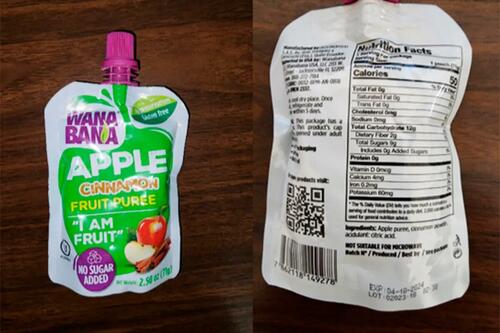
Authored by Lorenz Duchamps via The Epoch Times (emphasis ours),
U.S. health officials are investigating whether three brands of recalled cinnamon apple puree and applesauce that left dozens of American children sickened may have been intentionally contaminated with lead.

The U.S. Food and Drug Administration (FDA) first reported adverse events in children as young as 1 year old in October. The agency has since launched an inspection at a plant in Ecuador that produced the cinnamon-flavored applesauce products.
Jim Jones, the FDA's deputy commissioner for Human Foods, told Politico in an interview published on Dec. 14 that although the investigation is still ongoing, investigators believe the adulteration may have been "an intentional act."
"We're still in the midst of our investigation. But so far all of the signals we're getting lead to an intentional act on the part of someone in the supply chain and we're trying to sort of figure that out," Mr. Jones said.
"My instinct is they didn't think this product was going to end up in a country with a robust regulatory process," he added. "They thought it was going to end up in places that did not have the ability to detect something like this."
The affected products were marketed to parents and children under the brands WanaBana apple cinnamon fruit puree and Schnucks- and Weis-branded cinnamon applesauce pouches. They were sold nationwide by grocery chains such as Dollar Tree, as well as online retailers such as Amazon.
In its latest update on the lead poisoning outbreak, the U.S. Centers for Disease Control and Prevention (CDC) said it has identified a total of 125 cases from 22 states across the nation.
Of those cases, 46 are confirmed, 68 are probable cases, and 11 are suspected, according to the CDC. So far, all of the children are aged 6 or younger.
'Economically Motivated Adulteration'
Meanwhile, the FDA said health officials are looking into several theories as to why or by whom the lead was added to the applesauce pouches, pointing out that the agency currently believes the adulteration was "economically motivated."
"The FDA can confirm that one of the theories the agency is exploring is the potential that the cinnamon contamination occurred as a possible result of economically motivated adulteration," an FDA spokesperson told Consumer Reports, stressing additional investigation is needed before the agency reaches any conclusions.
According to the FDA, economically motivated adulteration refers to someone intentionally leaving out, taking out, or substituting an ingredient to make the product appear better or of greater value.
Asked why U.S. food safety laws wouldn't have prevented the tainted products from entering the country, Mr. Jones said intentional adulteration is "always going to be tricky to absolutely stop."
"We have limited authority over foreign ingredient suppliers that do not directly ship product to the U.S. because their food undergoes further manufacturing/processing prior to export," the FDA spokesperson told Politico, which first reported the story.
More Details
According to the CDC, there is "no safe blood lead level" for young children. The agency said it uses a marker of 3.5 micrograms per deciliter to identify children with elevated blood lead levels—higher than most American children aged between 1 and 5 years.
In a report released on Nov. 13, the CDC said an investigation found 22 children who had consumed the lead-contaminated applesauce pouches had blood lead levels as high as 29 micrograms per deciliter, far above the CDC's marker of 3.5 micrograms per deciliter.

Three recalled applesauce products—WanaBana apple cinnamon fruit puree pouches, Schnucks-brand cinnamon-flavored applesauce pouches and variety pack, and Weis-brand cinnamon applesauce pouches. (FDA via AP)
The children experienced signs and symptoms including headache, nausea, vomiting, diarrhea, change in activity level, and anemia, according to the CDC.
Lead is toxic to humans, and exposure at any age or health status can lead to serious symptoms. In adults, high blood lead levels can increase their risk for high blood pressure, other cardiovascular effects, kidney problems, adverse reproductive outcomes, and gout.
Although most children with lead exposure have no obvious immediate symptoms, parents and caretakers should consult a health care professional if they suspect a child may have been exposed to lead, according to the FDA.
Short-term exposure to lead could result in headaches, abdominal pain/colic, vomiting, and anemia, while longer-term exposure could result in irritability, lethargy, fatigue, muscle aches or muscle prickling/burning, constipation, difficulty concentrating/muscular weakness, tremor, and weight loss.
According to the American Academy of Pediatrics, heavy metals like lead can get into food products from the soil, air, water, or industrial processes.
Authored by Lorenz Duchamps via The Epoch Times (emphasis ours),
U.S. health officials are investigating whether three brands of recalled cinnamon apple puree and applesauce that left dozens of American children sickened may have been intentionally contaminated with lead.

The U.S. Food and Drug Administration (FDA) first reported adverse events in children as young as 1 year old in October. The agency has since launched an inspection at a plant in Ecuador that produced the cinnamon-flavored applesauce products.
Jim Jones, the FDA’s deputy commissioner for Human Foods, told Politico in an interview published on Dec. 14 that although the investigation is still ongoing, investigators believe the adulteration may have been “an intentional act.”
“We’re still in the midst of our investigation. But so far all of the signals we’re getting lead to an intentional act on the part of someone in the supply chain and we’re trying to sort of figure that out,” Mr. Jones said.
“My instinct is they didn’t think this product was going to end up in a country with a robust regulatory process,” he added. “They thought it was going to end up in places that did not have the ability to detect something like this.”
The affected products were marketed to parents and children under the brands WanaBana apple cinnamon fruit puree and Schnucks- and Weis-branded cinnamon applesauce pouches. They were sold nationwide by grocery chains such as Dollar Tree, as well as online retailers such as Amazon.
In its latest update on the lead poisoning outbreak, the U.S. Centers for Disease Control and Prevention (CDC) said it has identified a total of 125 cases from 22 states across the nation.
Of those cases, 46 are confirmed, 68 are probable cases, and 11 are suspected, according to the CDC. So far, all of the children are aged 6 or younger.
‘Economically Motivated Adulteration’
Meanwhile, the FDA said health officials are looking into several theories as to why or by whom the lead was added to the applesauce pouches, pointing out that the agency currently believes the adulteration was “economically motivated.”
“The FDA can confirm that one of the theories the agency is exploring is the potential that the cinnamon contamination occurred as a possible result of economically motivated adulteration,” an FDA spokesperson told Consumer Reports, stressing additional investigation is needed before the agency reaches any conclusions.
According to the FDA, economically motivated adulteration refers to someone intentionally leaving out, taking out, or substituting an ingredient to make the product appear better or of greater value.
Asked why U.S. food safety laws wouldn’t have prevented the tainted products from entering the country, Mr. Jones said intentional adulteration is “always going to be tricky to absolutely stop.”
“We have limited authority over foreign ingredient suppliers that do not directly ship product to the U.S. because their food undergoes further manufacturing/processing prior to export,” the FDA spokesperson told Politico, which first reported the story.
More Details
According to the CDC, there is “no safe blood lead level” for young children. The agency said it uses a marker of 3.5 micrograms per deciliter to identify children with elevated blood lead levels—higher than most American children aged between 1 and 5 years.
In a report released on Nov. 13, the CDC said an investigation found 22 children who had consumed the lead-contaminated applesauce pouches had blood lead levels as high as 29 micrograms per deciliter, far above the CDC’s marker of 3.5 micrograms per deciliter.

Three recalled applesauce products—WanaBana apple cinnamon fruit puree pouches, Schnucks-brand cinnamon-flavored applesauce pouches and variety pack, and Weis-brand cinnamon applesauce pouches. (FDA via AP)
The children experienced signs and symptoms including headache, nausea, vomiting, diarrhea, change in activity level, and anemia, according to the CDC.
Lead is toxic to humans, and exposure at any age or health status can lead to serious symptoms. In adults, high blood lead levels can increase their risk for high blood pressure, other cardiovascular effects, kidney problems, adverse reproductive outcomes, and gout.
Although most children with lead exposure have no obvious immediate symptoms, parents and caretakers should consult a health care professional if they suspect a child may have been exposed to lead, according to the FDA.
Short-term exposure to lead could result in headaches, abdominal pain/colic, vomiting, and anemia, while longer-term exposure could result in irritability, lethargy, fatigue, muscle aches or muscle prickling/burning, constipation, difficulty concentrating/muscular weakness, tremor, and weight loss.
According to the American Academy of Pediatrics, heavy metals like lead can get into food products from the soil, air, water, or industrial processes.
Loading…



